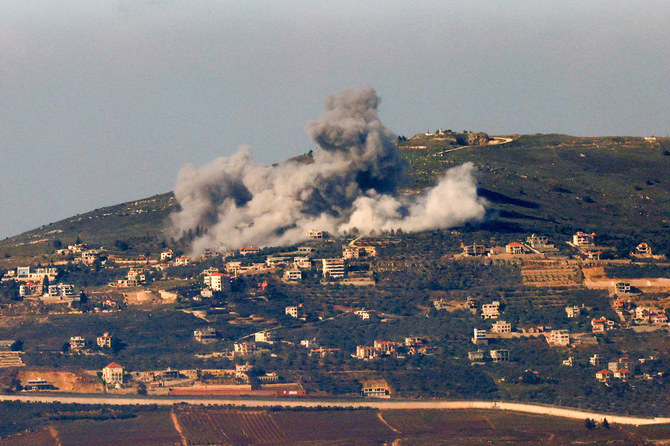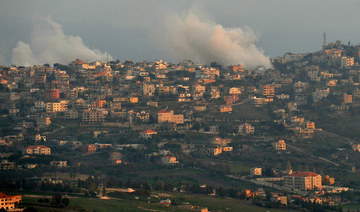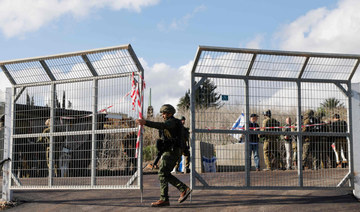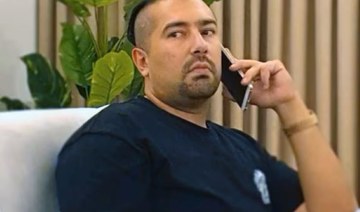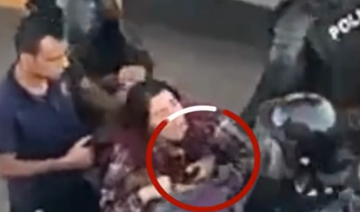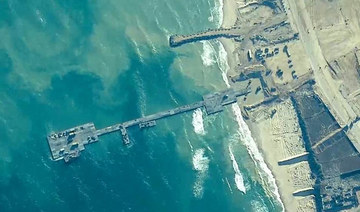BEIRUT: Hostilities between Hezbollah and Israel expanded into new territory on Thursday as Lebanese civil society figures appealed for national neutrality.
In response to the violence, which began 103 days ago, Lebanon’s deputy speaker of parliament called for urgent diplomatic action.
“The idea of opening the war front is extremely dangerous, and the only solution is through diplomatic means,” said Elias Bou Saab, who also serves as a liaison between the Lebanese government and US envoy Amos Hochstein.
His comments followed a meeting with Egypt’s ambassador to Lebanon, Alaa Moussa.
Bou Saab urged the “importance of continuing to exert diplomatic efforts to reach a solution to end the war and then transition to the post-ceasefire stage in Lebanon, including the issue of demarcating the land borders.”
Meanwhile, Lebanese civil society figures at a major gathering repeated demands for the country to remain neutral in the Israel-Hamas war.
The Greater Lebanon State Gathering drew heads of religious communities, political parties, and diplomatic, social, academic and union leaders to the Maronite Patriarchate headquarters.
Maronite Patriarch Bechara Al-Rahi oversaw the event.
Former President Amin Gemayel called for “reclaiming Lebanon’s sovereignty, independence and unity by establishing neutrality.”
He added: “The time has come for Lebanon to rescue itself by having all components embrace being fully Lebanese first.
“This would complete Lebanon’s national identity and unify it without privileges, only guaranteeing it through a strong and capable state unless we want Lebanon to be divided into areas of influence based on the interests of others at the expense of the national interest.”
Former Minister Ashraf Rifi demanded “reclaiming sovereignty, lifting guardianship, protecting the constitution and activating institutions.”
He added: “We vow to prevent Lebanon from being turned into an arena for settling regional scores. We will restore the state’s stature.
“The army and legitimate security institutions will be the only ones responsible for security. We vow to confront militia weapons, liquidation, assassination and terrorism.”
Activist Hayat Arslan called for “positive neutrality,” adding that it “protects us, adheres to international resolutions, and makes Lebanon a state of law and institutions.”
On Thursday morning, Israeli media reported the firing of at least five shells from Lebanon toward the Al-Manara settlement in the Upper Galilee region.
An Israeli drone bombed a car in Souk El-Khan near Kawkaba on Thursday. Israeli artillery also fired two shells at the outskirts of Kawkaba.
An Israeli drone fired a missile into the garden of a home in the center of the town of Kawkaba, causing serious damage to the site but no casualties. A shell also fell between houses in the town of Hula.
Israeli jets carried out strikes on the outskirts of the towns of Rab El-Thalathine, Al-Taybeh and Odaisseh.
The Marjayoun Plain was shelled by the Israeli army, which also targeted the area between Al-Dhayra and Yarin, and the eastern outskirts of Mays Al-Jabal with heavy smoke and phosphorus bombs.
The Israeli army also fired into forest areas adjacent to the town of Aita Al-Shaab.
Jets were seen flying over the western sector, reaching the villages and towns of the Tyre district.
Israeli army spokesman Avichay Adraee said in a post on X: “Air Force warplanes raided Hezbollah infrastructure in the Odaisseh area, and the Israeli army attacked Kfarkela and Marjayoun.”
Adraee added that “two shells were fired from Lebanon toward the Arab Al-Aramshe area and landed in open areas.”
On Thursday morning, the Israeli army targeted the vicinity of the Al-Abad military site overlooking the town of Hula, and also hit Tallet Hamames, the Marjayoun Plain, and the Hura and Aaziyyeh areas in Deir Mimas.
Israeli reconnaissance planes continued to fly over the villages of the western and central sectors throughout the night, reaching the outskirts of the Litani River.
This coincided with the launching of flare bombs over the border villages adjacent to the Blue Line.
On Wednesday evening, the Israeli army escalated its attacks, with jets bombing the outskirts of Tyre’s Qalileh town, an extension of the Mieh Mieh Palestinian refugee camp.
The bombing raid killed Hamas member Walid Hassanein, who was later mourned. Others from the refugee camp, including Mohammed Azzam and Abou Nayef, were wounded.



